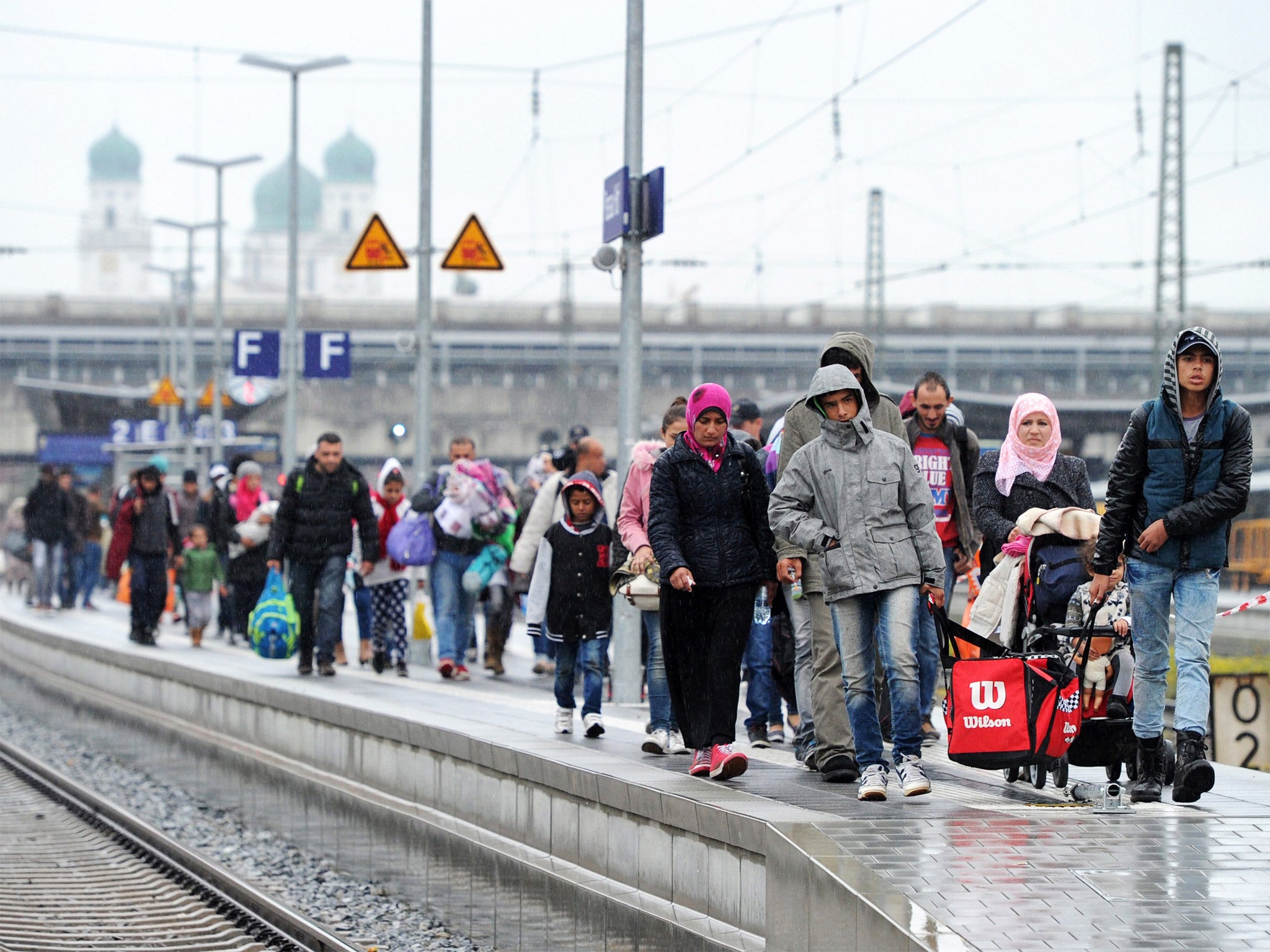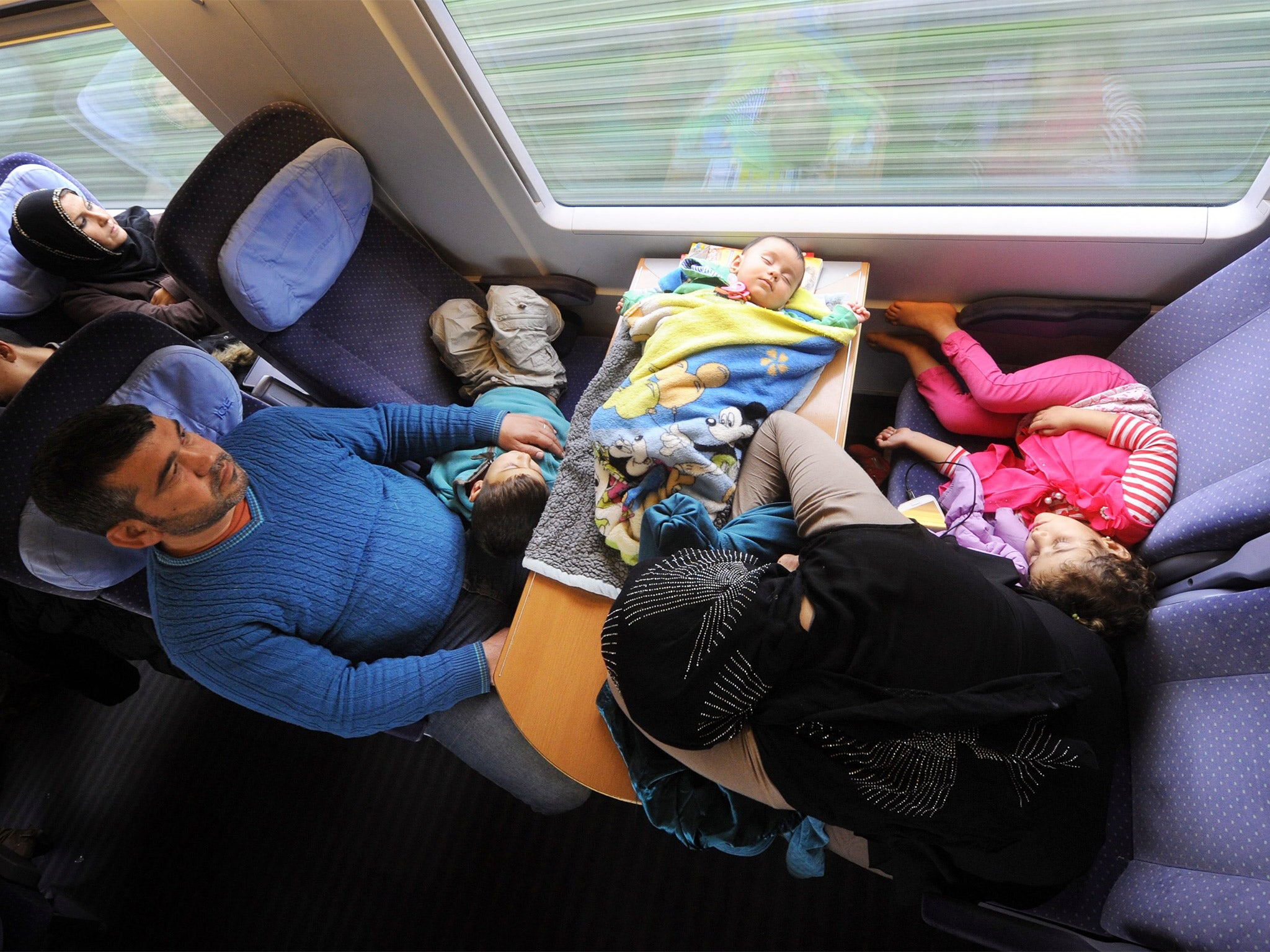Refugee crisis: Germany's 'welcome culture' fades as thousands continue to arrive
Patience is running out in the border town of Passau which has borne the brunt of the influx

Your support helps us to tell the story
From reproductive rights to climate change to Big Tech, The Independent is on the ground when the story is developing. Whether it's investigating the financials of Elon Musk's pro-Trump PAC or producing our latest documentary, 'The A Word', which shines a light on the American women fighting for reproductive rights, we know how important it is to parse out the facts from the messaging.
At such a critical moment in US history, we need reporters on the ground. Your donation allows us to keep sending journalists to speak to both sides of the story.
The Independent is trusted by Americans across the entire political spectrum. And unlike many other quality news outlets, we choose not to lock Americans out of our reporting and analysis with paywalls. We believe quality journalism should be available to everyone, paid for by those who can afford it.
Your support makes all the difference.Inside a converted Oktoberfest beer tent at the back of Passau’s train station 300 bewildered and exhausted refugees sat penned behind steel barriers as they awaited so-called “Fast ID” registration.
They were the latest to arrive in the German town on Austria’s border which has become one of the main entry points for migrants. As two young voluntary workers tried to hand out drinks, a group of Syrians and their small children suddenly stood up and started to move towards the beer tent door and a waiting bus outside.
But this act of apparent insubordination was too much for one uniformed police officer, who leapt on to a bench and screamed: “Sit down! Don’t move!” Worn out by weeks of refugee duty, his temper had snapped. The refugee children started crying.
Passau’s railway station has a sign proclaiming: “Refugees Welcome”. But apart from the police, there was no one to greet the thousands of migrants arriving this week. “It’s not like a month ago when lots of ordinary people would come and applaud when they arrived,” admitted Commissioner Albert Poerschke, the city’s police spokesman on refugees. “The welcome culture seems to have evaporated. We waiting for the rest of Europe to help us solve the crisis,” he told The Independent.
The absence of this “welcome culture”, which Chancellor Angela Merkel called for at the start of the refugee crisis in September was also palpable on the streets of Passau – an idyllic 18th-century Danube town dubbed “Bavaria’s Venice”. Anton, a hotel receptionist, who did not want to reveal his surname was adamant: “Of course we have to help them, but I think we will lose our German culture if they don’t stop coming in. It is too much. Maybe we would build a wall around Passau,” he told The Independent.
Since Germany started introducing police controls on its borders with Austria and the Czech Republic in mid-September, the Bavarian border towns of Passau and Rosenheim have borne the brunt of Germany’s refugee influx. According to a leaked government report, the number of asylum applications is expected to reach 1.5 million this year – almost double the estimated 800,000.
Bavaria alone has taken in 225,000 refugees since the beginning of September. Almost half have passed through Passau, which is accepting between 1,000 and 5,000 new arrivals each day. Jürgen Dupper, the city’s Social Democrat mayor describes the town’s predicament as “very, very dramatic” and has demanded better border controls. Yet the influx shows no sign of abating.
A survey of Syrian refugees who have made it to Germany concluded that the main reason for their flight was fear of President Bashar al-Assad. More than 90 per cent were fleeing the fighting, with two-thirds blaming the Assad government. Only 32 per cent said they were fleeing Isis.
One-third of the refugees arrive in Germany by train; the rest enter from Austria by road, and often on foot. The Austrians are reported to be handing each refugee a map showing where the German border is. “Many ask us whether they are in Australia,” an Austrian police spokesman was quoted as saying. “About 80 percent of the Syrian and Afghan refugees don’t know where or what Austria is. That’s why they want to go to Germany,” he added.

But opinion polls suggest the German public is becoming increasingly frustrated at what many see as the failure of Ms Merkel’s government to stem the influx. A survey published on Monday by Germany’s Market and Social Research group showed that 59 per cent of Germans thought Ms Merkel was wrong to allow refugees to arrive unhindered from Hungary at the end of August. A month ago 66 percent thought the Chancellor was doing the right thing. The polls also show that a large majority of Germans now want the influx stopped.
Ms Merkel is also under intense political pressure to end her “open door” refugee policy. This week an open letter signed by 34 of her conservative MPs and state politicians complained that the refugee crisis was becoming unbearable. On Tuesday, Ms Merkel announced plans to set up a special refugee crisis unit.
Whether the measure will better the lot of Syrian refugees like 30-year-old Ali Nabo is questionable. After a three-week journey with his wife and three young daughters from the Syrian city of Homs, he stood in a filthy coat in the Oktoberfest beer tent. He and his family had to ditch all their belongings during their sea crossing from Turkey to Greece as they feared their rubber boat would sink. Now he was worried he would be separated from his wife and children. What seemed like the first big smile for a long time shone from his face when a policeman reassured him: “We don’t split up families.”
* An operation to intercept and seize vessels used by smugglers controlling the trafficking of migrants across the Mediterranean has begun. The second phase of the European Union’s Operation Sophia targets the vessels rather than focusing on surveillance and rescues. But questions have already been raised about its likely effectiveness because of doubts that the EU has committed enough ships and manpower to tackle the smugglers.
Join our commenting forum
Join thought-provoking conversations, follow other Independent readers and see their replies
Comments